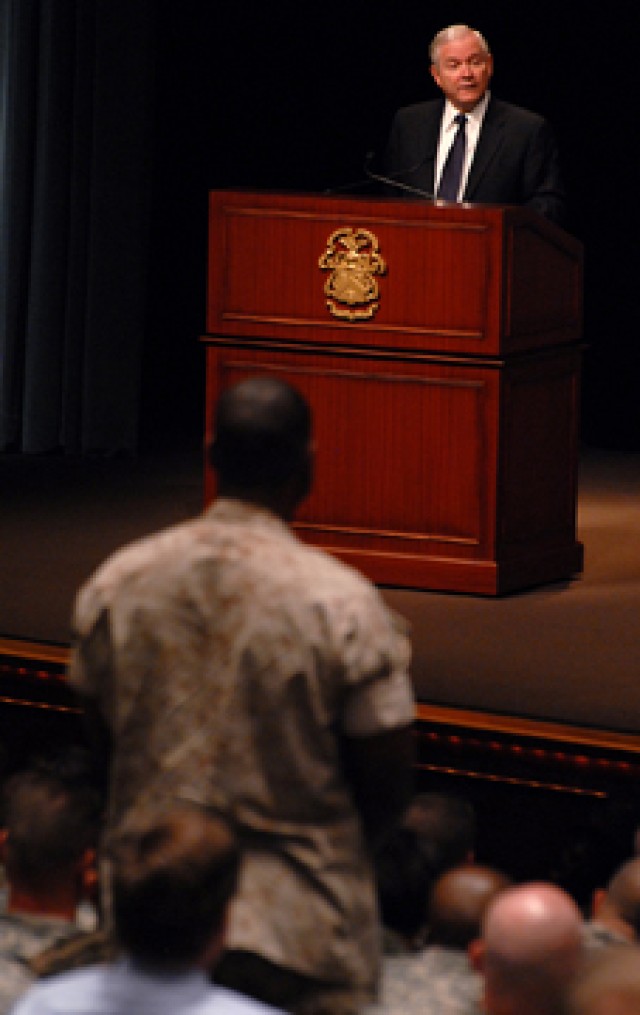FORT LEAVENWORTH, Kan. (May 13, 2010) - Intermediate-level military officers who have combat experience must use their experience to influence their branches as they enter leadership positions, the secretary of Defense told Command and General Staff College students May 7.
Robert Gates visited Kansas this month to talk with Intermediate Level Education students at CGSC, commemorate the 65th anniversary of the end of World War II in Europe at the Dwight D. Eisenhower Presidential Library in Abilene, and meet with military spouses at Fort Riley.
Gates told CGSC students that because they are some of the most heavily deployed and combat-tested groups of officers in military history, much of the success of the Army is based on them.
"You are the next generation of forged 'Iron Majors' going into operations or executive officer positions, some of the most important and pivotal jobs in the Army: charged with executing your commander's operational vision, mentoring the next generation of junior officers and applying lessons learned in the classroom and on the battlefield," Gates said.
He said their leadership duties are both upward and downward in the chain of command.
"Not to put too fine a point on it, but the fate of the entire organization will rest on your hard work and ability to forge a successful team," he said.
Gates said not all decisions made by the intermediate-level officers will be popular.
"You are certain to face situations where you must stand alone in making a difficult, unpopular decision; when you must challenge the opinion of superiors or tell them that you can't get the job done with the time and resources available; or when you will know that what superiors are telling the press or the Congress or the American people is inaccurate," he said.
Gates said the military needs to do a better job of working with its partners to control its Defense spending, but said in his speech to CGSC students that care for Soldiers and their families remains a vital part of the budget.
"The saying goes you recruit a Soldier, but you re-enlist a family," he said. "This year's Defense budget includes $9 billion for family support: child care, spousal services, and housing, among others."
Gates said the Department of Defense has also shifted funding for family support programs from supplemental war requests to the base budget so the programs won't go away when wars end.
Gates mentioned several Fort Leavenworth organizations by name - the Combined Arms Center, the Center for Army Lessons Learned and Military Review - and highlighted their importance. CAC has become the intellectual center of gravity, adapting quickly to the latest technologies and information, he said. CALL is using warfighting lessons of the past to give Soldiers guidance on future warfare. Military Review allows officers to criticize the institution or methods of conducting business.
"I believe this is a sign of institutional vitality, health and strength," Gates said. "I encourage you to take on the mantle of fearless, thoughtful, but loyal dissent whenever the situation calls for it."
Students said they were pleased Gates took time out of his busy schedule to meet with them.
"I saw a lighter side of Secretary Gates," said Marine Maj. Richard Donnelly, ILE class 2010-01. "The only time I've seen him in the past is on Sunday morning talk shows, news interviews."
In a question and answer session, Gates talked about the importance of professional military education institutions, the need to reinstate many of the functions of the U.S. Department of State and a need to closely examine the role of the Marine Corps. Gates indicated that a force that moves on land might be less suited to the Navy and more suited to the Army, but stopped short of defining a specific future role for the Marines.
Donnelly and his classmate, Marine Maj. Art Houghtby, also in 2010-01, said they've heard their branch questioned before. They were glad to hear that Gates is talking with military leadership to determine the Marines' role.
"This is nothing new for the Marine Corps," Donnelly said.
"People are always questioning their purpose. We've always been an expeditionary force, whether we're coming from the sea or not," he said.


Social Sharing